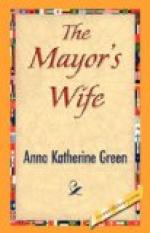“With her loss the one true and unselfish bond which held me to my lover was severed, and, unknown to him—(perhaps he hears it now for the first time)—I had many hours of secret hesitation which might have ended in a positive refusal to marry him if I had not been afraid of his anger and the consequences of an open break. With all his protestations of affection and the very ardent love he made me, he had not succeeded in rousing my affections, but he had my fears. I knew that to tell him to his face I would not marry him would mean death to him and possibly to myself. Such intuition, young as I was, did I have of his character, though I comprehended so little the real range of his mind and the unswerving trend of his ambitious nature.
“So my, wedding-day came and we were united in the very hotel where I had so long served in a menial capacity. The social distinctions in such a place being small and my birth and breeding really placing me on a par with my employer and his family, I was given the parlor for this celebration and never, never, shall I forget its mean and bare look, even to my untutored eyes; or how lonely those far hills looked, through the small-paned window I faced; or what a shadow seemed to fall across them as the parson uttered those fateful words, so terrible to one whose heart is not in them: What God hath joined together let no man put asunder. Death and not life awaited me on that bleak hillside, or so I thought, though the bridegroom at my side was the handsomest man I had ever seen and had rather exceeded than failed in his devotion to me as a lover.
“The ceremony over, I went up-stairs to make my final preparations for departure. No bridesmaids or real friends had lent joy to the occasion; and when I closed that parlor door upon my bridegroom and the two or three neighbors and boon companions with whom he was making merry, I found myself alone with my dead heart and a most unwelcome future. I remember, as the lock clicked and the rude hall, ruder even than the wretched half-furnished room I had just left, opened before me, a sensation of terror at leaving even this homely refuge and a half-formed wish that I was going back to my dish-washing in the kitchen. It was therefore with a shock, which makes my brain reel yet, that I saw, lying on a little table which I had to pass, a letter directed to myself, bearing the postmark, Detroit. What might there not be in it? What? What?
“Gasping as much with fear as delight, I caught up the letter, and, rushing with it to my room, locked myself in and tore open the envelope. A single sheet fell out; it was signed with the name I had heard whispered in my ear from early childhood, and always in connection with riches and splendor and pleasures,—it was rapture to dream of. This was an agitation in itself, but the words—the words! I have never told them to mortal being, but I must tell them now; I remember them as I remember the look of my child’s face when she was first put in my arms, the child—”




